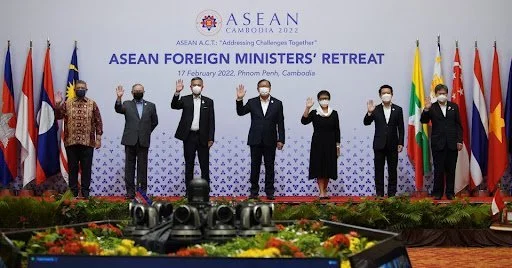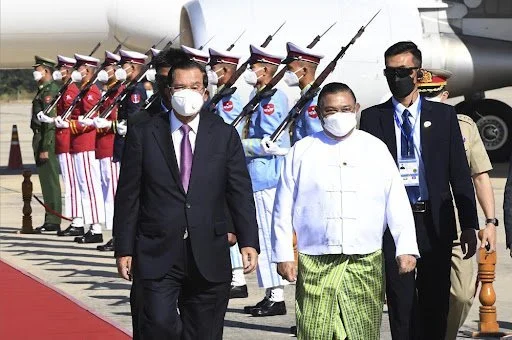Elephant in the Room: ASEAN’s Response to Myanmar’s Military Junta
Malaysia's Foreign Minister Saifuddin Abdullah, Philippine Foreign Affairs Secretary Teodoro Locsin Jr., Singapore's Foreign Minister Vivian Balakrishnan, Cambodia's Foreign Minister Prak Sokhonn, Indonesia's Foreign Minister Retno Marsudi, Laos's Foreign Minister Saleumxay Kommasith and ASEAN Secretary General Lim Jock Hoi attending the ASEAN Foreign Ministers' Retreat in Phnom Penh, Cambodia, February 17, 2022. Photo: Reuters/Cindy Liu
On Feb. 17, the Association of Southeast Asian Nations (ASEAN) delegates arrived in Phnom Penh for their annual ministerial retreat. 2022 chair of the organization and host of the meeting Cambodia has had to contend with the new military junta governing Myanmar, and chose to exclude the country’s foreign minister from this year’s conference.
After the democratic government ouster last year, state-sponsored violence spread across Myanmar, which the UN has characterized as a “campaign of terror.” Since the coup, ASEAN’s member states have sought a solution to the crisi– with little success. This issue has captivated the member states, with Indonesian foreign minister Retno Marsudi telling reporters that “ASEAN cannot act business as usual…when looking into this development.”
Since the coup, ASEAN has permitted Myanmar to send “non-political” representatives to meetings. But Myanmar chose not to attend the conference rather than send a non-political representative, and instead observed the meeting by video.
The Indonesian foreign ministry spokesperson has in the past reflected that representation was the “common guide for all ASEAN members,” and member states have taken differing views on whether Myanmar should be excluded from conferences.
Myanmar’s foreign minister deemed his exclusion hypocritical to “the principles and practice of equal representation in ASEAN.” The response to the situation in Myanmar will test ASEAN’s organizational commitment to non-interference and its role in governing its member states.
Cambodian Prime Minister Hun Sen, left, greets Myanmar Foreign Minister Wunna Maung Lwin, front right, in Naypyitaw, Myanmar, on Jan 7, 2022. Photo: AP Photo/An Khoun Sam Aun
As the junta seeks to legitimize itself, ASEAN has had to contend with its role as a mediator of the peace process following the coup. The junta, or State Administrative Council (SAC), has sought to discredit and disparage the former administration, or National Unity Government (NUG), throughout the peace process.
The Cambodian foreign minister Prak Sokhonn noted the delicate nature of this crisis at the annual meeting, saying “you cannot on one hand try to engage with someone and on the other hand, engage with the one who is considered by the former as terrorists.”
ASEAN tasked Sokhonn with being its special envoy to rebuild support for ASEAN’s Five-Point Consensus peace plan, which the SAC has ignored. Included in this plan is the condition that Aung San Suu Kyi, the former ousted leader of the NUG, be given access and authority in the peace talks. Suu Kyi has been detained since her removal from power, and the junta refused to allow ASEAN members to meet with her. Sokhonn remains optimistic, saying “let the special envoy, as the bridge, as the facilitator, speak with (the NUG).”
While the lack of clarity over how to treat Myanmar overwhelmed the summit in Phnom Penh, the member states remain committed to the peace process. Foreign Minister of the NUG Zin Mar Aung reflected this commitment, stating that he appreciated the “strong support to find a solution on Myanmar.”


